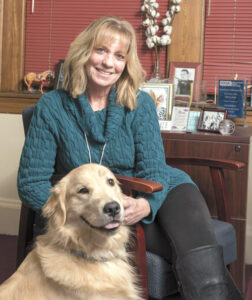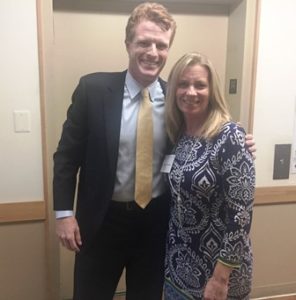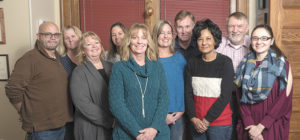By Jane Keller Gordon, Assistant Editor

Photo/Andy Weigl, Weigl Photography
Taunton – In 2004, three years into her son’s opioid addiction, Joanne Peterson decided to let the world know about it. Learn To Cope (LTC) is the result, a nonprofit that has helped thousands of parents and family members deal with loved ones who are addicted to opiates and other drugs.
Now funded by the Massachusetts Department of Public Health, LTC has chapters in 12 of 14 counties in Massachusetts, two in Florida and one in Idaho; 17 staff members; and a 24/7 private online discussion board used by 10,000 people.
According to its website, www.learn2cope.org, approximately 600 families per week attend meetings run by trained facilitators who have walked in their shoes. Meetings “offer peer-support, education, resources and HOPE for families with addiction and recovery. They are a safe place for members to share their experiences, ask questions, learn about addiction and listen to guest speakers.”
By distributing Narcan, to date, Learn to Cope has been responsible for reversing 130 opioid overdoses.
A traumatic early life
Growing up, Peterson would have never imagined that she would be the founder and executive director of a nonprofit that helped so many families in crisis. Nor could she imagine she would receive dozens of accolades for her advocacy and be invited to the White House seven times.
As a child and then young adult, Peterson saw several of her family members cope with mental illness and addiction.
“I came from a long line of trauma, domestic violence, and substance abuse… As a child, I didn’t know that things were wrong… When I was about 10, I realized that things were not normal,” she said.
“In 1932, my mother’s father, who was the chief of police in Randolph, arrested my great-uncle who shot and killed his brother-in-law, my other grandfather. My father, who was six, saw it happen. Four years later, my father’s older brother hung himself.
”My mother was only a year old then and the families didn’t know each other. Her great-grandfather had died of an alcohol overdose, so her father, the chief of police, did not drink.”
Peterson’s father brought the trauma of his youth into his own family, which also included her two sisters, and a brother.
“We moved a lot. When I was in kindergarten, I can remember my father driving us to Anchorage Alaska, where he worked on the pipeline as a union carpenter,” she recalled.
Four years later, her parents divorced and her mother returned to Massachusetts with the children. Her father stayed behind.
Her brother battled depression and substance abuse his whole life. He was incarcerated at a young age.
“It was a catalyst for the rest of his life,” Peterson said. “He felt better when he was in jail.”
One of her sister’s became schizophrenic in her early twenties.
“I was a kid at risk in high school, and I did stupid things,” Peterson said. “A lot of my journey paved the way for the way I lived.”
The opioid crisis hits her family
She had her first son when she was 17. She moved west and had a daughter there, and survived domestic violence. She came back to Massachusetts and lived in a shelter for a time.
“I survived the way my mother taught me to,” said Peterson.
Her life stabilized 26 years ago when she reconnected and then married her husband Paul, who she knew growing up. They had a son, and he adopted her two older children.
Neither Peterson nor her husband had an issue with alcohol or substance abuse. But unfortunately, their oldest son did. For Peterson, it was like déjà vu.
“We tried to follow a manual on how to raise healthy kids in a safe environment. My son joined the National Guard and was great. But when he came home after basic training, something wasn’t right. He was losing weight and wouldn’t shower.
“Things started missing in our house. We found out that he was shooting heroin in his room. This was 2001. Later, we discovered that he was using OxyContin,” she explained.
“I wasn’t going to live like this my whole life,” she added. “I didn’t want my other children to suffer this trauma.”
At the time, there was very little information on treatment. When she was not working at her fulltime job, she spent hours scouring the internet for information.
She and Paul eventually sent their son to private treatment, but he relapsed. Through the courts, they got a “Section 35,” which under Massachusetts’s law, involuntarily forced him to go back to treatment.
In 2004, their son was arrested, and it was printed in the local newspaper.
“It brought back all the trauma I felt as a kid visiting jail. I thought, this is either going to kill me or I’m going to do something about it,” she recalled. “I was facing stigma, trauma, and gossip. I decided that I was going to tell my story.”
A mother says ‘Enough’
She picked up the phone and called Jorge Quiroga, a reporter for television station WCVB in Boston.
“I couldn’t believe that I was on the phone with him. I said we have a huge problem here in Raynham and no one is talking about it. He ended up interviewing my son in jail. He expected to meet a punk kid but that wasn’t my kid. [Quiroga] told me that he wanted to cry when he left the jail,” she said.
Next, Peterson picked up a flyer from then-Norfolk County District Attorney Bill Keating’s office that was entitled, “There’s a stranger in town. What parents want to know.”
“I called the number on the pamphlet, and Keating asked me to come to a forum. I wrote a speech that I was going to give in front of 200 people. I cried so hard that my tears wiped out the print. I put the speech down and just spoke,” she said. “I said that I just wanted my son back. People cheered, I was so used to being stigmatized by people who said ‘I know your brother, I know your sister.”
Later, she started holding meetings in Randolph which gradually grew so large they had to be moved to the Stoughton Police Station.
In 2007, a nurse practitioner and community outreach person from Partners Healthcare showed up at a meeting.
“They heard about our meetings. They told me that we needed to meet on the North Shore, and asked me to join them. For a whole year, we went there every week, first to court houses and police stations, and then, we started meetings,” said Peterson.
A mother becomes an advocate and a leader
That same year, Peterson received a letter from Representative McCarthy that said that $100,000 was earmarked for her program.
“I didn’t know what that meant. My boss at my job said, ‘you’ve already created an organization; you need to quit your job and start a nonprofit,” she recalled. “You’re doing what you’re supposed to be doing.’”
And so she created Learn to Cope.
By 2010, Peterson was training people to run other groups.
“We taught them about Narcan. We didn’t want meetings to be just about what we were going through. We wanted it to be about education. People needed to learn about the addiction.”
This past fall, she endorsed Charlie Baker in his re-election bid for governor.
“He’s the third governor since I’ve been doing this work. Almost immediately he put his money where his mouth is. We watched women go to jail for section 35 for years, while men went to treatment. Baker changed that. He’s passed legislation. He’s come to our meetings without cameras or ads. He’s listened and he’s cried,” said Peterson.
Sadness…yet hope
Her office wall used to be covered with obituaries. Now there’s a file cabinet down the hall that’s filled with folders for those who died from overdoses.
“There’s so much more to do. We need to do something about big pharma. They’re making billions off of this,” said Peterson.
But in spite of so much loss, she still feels there is hope. As proof, her own son has been in recovery for several years.
The phrase “Life is a journey, not a destination,” is now on her wall.

To learn more about Learn to Cope, visit www.learn2cope.org.


Photo/Andy Weigl, Weigl Photography












